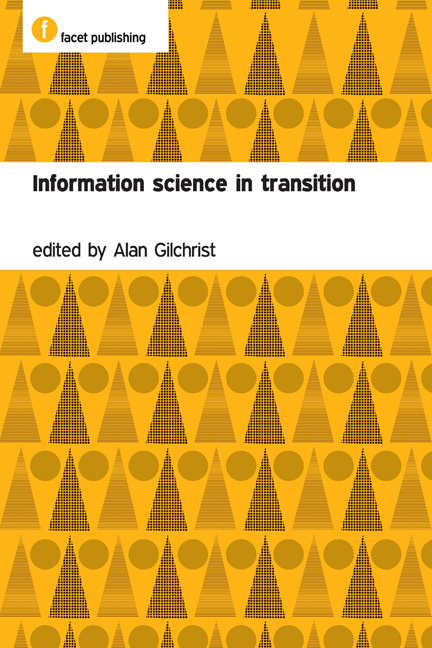Book contents
- Frontmatter
- Contents
- Contributors
- Preface
- Editorial
- Guest Editorial: Meeting the challenge
- 1 Fifty years of UK research in information science
- 2 Smoother pebbles and the shoulders of giants: the developing foundations of information science
- 3 The last 50 years of knowledge organization: a journey through my personal archives
- 4 On the history of evaluation in IR
- 5 The information user: past, present and future
- 6 The sociological turn in information science
- 7 From chemical documentation to chemoinformatics: 50 years of chemical information science
- 8 Health informatics: current issues and challenges
- 9 Social informatics and sociotechnical research – a view from the UK
- 10 The evolution of visual information retrieval
- 11 Information policies: yesterday, today, tomorrow
- 12 The disparity in professional qualifications and progress in information handling: a European perspective
- 13 Electronic scholarly publishing and Open Access
- 14 Social software: fun and games, or business tools?
- 15 Bibliometrics to webometrics
- 16 How I learned to love the Brits
- Index
11 - Information policies: yesterday, today, tomorrow
Published online by Cambridge University Press: 08 June 2018
- Frontmatter
- Contents
- Contributors
- Preface
- Editorial
- Guest Editorial: Meeting the challenge
- 1 Fifty years of UK research in information science
- 2 Smoother pebbles and the shoulders of giants: the developing foundations of information science
- 3 The last 50 years of knowledge organization: a journey through my personal archives
- 4 On the history of evaluation in IR
- 5 The information user: past, present and future
- 6 The sociological turn in information science
- 7 From chemical documentation to chemoinformatics: 50 years of chemical information science
- 8 Health informatics: current issues and challenges
- 9 Social informatics and sociotechnical research – a view from the UK
- 10 The evolution of visual information retrieval
- 11 Information policies: yesterday, today, tomorrow
- 12 The disparity in professional qualifications and progress in information handling: a European perspective
- 13 Electronic scholarly publishing and Open Access
- 14 Social software: fun and games, or business tools?
- 15 Bibliometrics to webometrics
- 16 How I learned to love the Brits
- Index
Summary
Abstract
This article presents a brief history of the development of ideas about national and organizational information policies, from the first establishment of a UK Ministry of Information in the First World War to the present day. The issues and tensions that have characterized attempts to develop and implement policies on the national and organizational scale are discussed, with particular reference to: the power relations between the parties to them; the relative significance accorded to information technology and information content; the transition from formulating policy to acting on it; and the threats to the survival of those policies that get as far as implementation. In conclusion, the contribution to date of information science to the theory and practice of information policies is assessed, and suggestions are offered on directions for future efforts, in the light of the past of this interesting field.
Introduction
I have to begin this article with a confession: up till now, I have always avoided writing about national information policies. Over the years, I have read much of what others have written on the subject and admired a good deal of it; but in my own work I have concentrated on trying to help organizations to develop information policies for themselves, by working with them and writing for them. It offers some chance of producing at least some visible effect within a reasonable time, while observation suggests that governments do not take much notice of what information scientists write about national information policies, even on those rare occasions when they actually invite their advice on the subject.
So when I was invited to contribute a paper on information policies to this special issue, my first inclination was to write only on organizational policies. But when I started re-reading the literature and thinking about the article, it became clear that national information policy was the essential context for organizational policies and strategies, which could not be properly understood without it.
Tackling the subject I had tried to avoid turned out to be worthwhile, because I began to see a coherent story, with some dominant themes that relate these two aspects of information policy.
- Type
- Chapter
- Information
- Information Science in Transition , pp. 249 - 282Publisher: FacetPrint publication year: 2009



